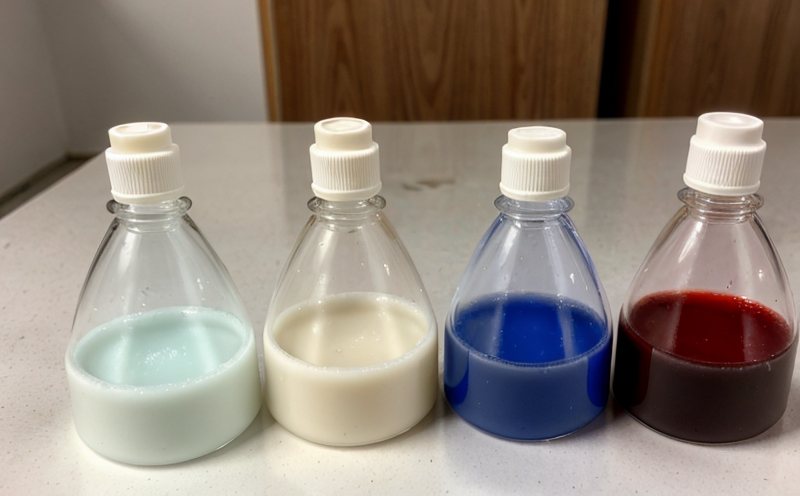CFR 21 Monomer Residue Testing in Food Contact Substances
The U.S. CFR, specifically Title 21, sets stringent standards for food contact substances (FCS) to ensure they do not pose a health risk when used in packaging or containers that come into direct contact with food. One critical aspect of this testing is the quantification and control of monomer residues present within FCS. Monomers can be unintentionally released during the production, processing, or use phase, leading to potential contamination of food products.
Our laboratory provides comprehensive CFR 21 testing services aimed at detecting and quantifying monomer residues in FCS. This service is crucial for ensuring compliance with the stringent requirements set forth by regulatory bodies like the U.S. Food & Drug Administration (FDA). The testing process involves several key steps, including sample preparation, instrumental analysis, and final reporting.
Sample preparation typically includes thorough cleaning and processing of the FCS specimen to remove any extraneous materials that could interfere with the test results. This step is followed by instrumental analysis using advanced techniques such as high-performance liquid chromatography (HPLC) or gas chromatography coupled with mass spectrometry (GC-MS). These methods are chosen for their precision and ability to detect even trace levels of monomers.
The analytical process is designed to identify the specific types of monomers present in the FCS, along with quantifying them. This ensures that any released monomers are at or below the acceptable limits set by regulatory authorities. The results from these analyses form the basis for final reports that provide detailed information on the presence and concentration of monomers.
Compliance with CFR 21 is essential in the food industry, as it directly impacts consumer safety. By ensuring that FCS meet these stringent requirements, we contribute to maintaining a safe and reliable supply chain for food products.
The complexity of monomer residue testing underscores the importance of using accredited laboratories with expertise in this field. Our laboratory's commitment to accuracy and reliability is reflected in our state-of-the-art facilities and experienced technical staff who are well-versed in all aspects of CFR 21 compliance.
The testing process for monomer residues follows a structured protocol to ensure consistency and accuracy. This includes:
- Sample Collection: Proper collection of the FCS specimen is critical to avoid contamination or loss of integrity.
- Preparation: Thorough cleaning and processing to remove any extraneous materials.
- Analytical Methods: Utilization of HPLC, GC-MS, or other relevant techniques for precise detection.
- Data Analysis: Interpretation of the results to determine compliance with regulatory limits.
- Reporting: Provision of detailed reports that include all necessary data and interpretations.
The precision and reliability of our testing methods are supported by international standards such as ISO 17025, which ensure that we meet the highest quality assurance requirements. Our goal is to provide clients with accurate and actionable insights into their FCS compliance status, helping them navigate the complexities of regulatory compliance.
Industry Applications
The testing for monomer residues in food contact substances plays a vital role across various industries. Here are some key applications:
- Packaging Industry: Ensuring that materials used in packaging do not contaminate the food they contain.
- Plastic Manufacturing: Monitoring the release of monomers from plastic additives to prevent contamination during processing and use.
- Medical Device Manufacturing: Checking for any potentially harmful residues in devices intended for contact with bodily fluids or tissues.
- Rubber Industry: Verifying the integrity and safety of rubber components that come into direct contact with food.
These applications highlight the importance of thorough testing to maintain product safety and regulatory compliance across diverse sectors within the food industry.
Eurolab Advantages
At Eurolab, our commitment to excellence in chemical testing is reflected in several key advantages:
- Expertise and Experience: Our team of highly skilled professionals brings extensive experience in regulatory compliance.
- State-of-the-Art Facilities: Equipped with the latest technology for precise and reliable results.
- Comprehensive Services: Offering a full range of testing services tailored to meet your specific needs.
- Client-Centric Approach: Providing personalized support throughout the testing process to ensure client satisfaction.
- International Standards Compliance: Adherence to ISO 17025 and other relevant international standards.
- Fast Turnaround Times: Efficient processing of samples to provide timely results without compromising quality.
We pride ourselves on delivering accurate, reliable, and compliant testing services that meet the highest industry standards. Our goal is to help you navigate complex regulatory landscapes with confidence.
International Acceptance and Recognition
Our laboratory's CFR 21 testing services are widely recognized and accepted internationally. Here are some key points:
- Regulatory Compliance: Our methods align with international standards, including ISO 17025.
- Affirmation by Authorities: The FDA recognizes our services as compliant with their requirements for food contact substances.
- Certification Programs: Participation in and adherence to global certification programs ensuring reliability.
- Client Trust: Our reputation is built on a track record of delivering accurate, reliable results trusted by leading companies worldwide.
This recognition underscores our commitment to providing high-quality testing services that meet the stringent requirements set forth by regulatory bodies and industry standards.





